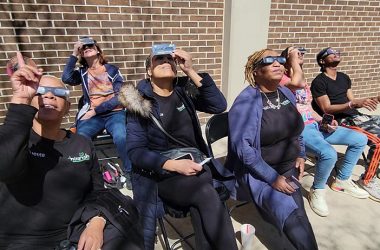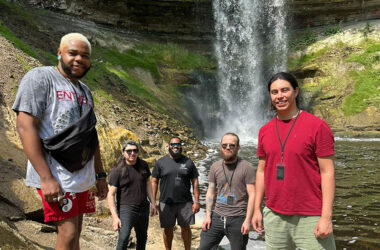Note: Michelle Duster, great-granddaughter of famed journalist and suffragist Ida B. Wells-Barnett, was the keynote speaker at Homewood-Flossmoor High School’s Pursuing the Dream event, an annual tribute to the work of Martin Luther King Jr. She spoke with the Chronicle on Jan. 23, the day before the event.

and spirit between her great-grandmother, Ida B. Wells-Barnett
and Martin Luther King Jr. (Eric Crump/H-F Chronicle)
Among Wells-Barnett’s achievements, she wrote a key anti-lynching work, “A Red Record,” published in 1895. She was involved in founding of the National Association for the Advancement of Colored People (NAACP) in 1909. She founded a number of other organization devoted to fighting against racism and for women’s rights.
Duster has written and contributed to a number of books concerning civil rights and racial justice. Her most recent include “Ida B. Wells, Voice of the Truth: Educator, Feminist, and Anti-Lynching Civil Rights Leader” in 2022 and “Ida B. the Queen” in 2021.
Who all are you trying to reach and by what means are you trying to reach them with “Ida B. The Queen”?
The audience that I had in mind in my head when I was working on the book was my students, who are right out of high school and kind of still in that stage of life where they’re trying to figure out what careers they want to be in, where they fit in in society. I tried my best and hopefully I succeeded to humanize Ida, and I incorporated information about her that I thought younger women in particular would be able to relate to.
I think it’s helpful for people to realize that she wasn’t just this superhero who had no emotions. One of the things I always, as a younger woman in particular, sought to know about my great-grandmother was who she was as a woman. Did she have some of the same emotions that I did? And that made me feel like I could relate to her more.
I wanted to incorporate that into the book so that other young people who are in that discovering who they are (period) could find something about her that they could relate to and feel like, ‘Oh my God, she’s just like me,’ or ‘I’m just like her.’
You and your great-grandmother are on generally the same mission, fighting for equality, but your world is much different than hers. Can you talk a bit about the similarities and differences in your experiences?
The similarity that I see between us is that we are we both fighting for equality, but I feel like it’s in different arenas because she was fighting for physical equality, physical access to accommodations and certain rights. She faced a whole lot more danger than I do. But I feel like I’m fighting for representation in the narrative about who African Americans are. So maybe that’s a similarity: that we both were kind of fighting for truth to be heard, countering stereotypes, because the rationale that was used to justify lynching was based on stereotypes or a really skewed narrative of who African Americans were, who deserved to be killed by mobs.
Today, there’s some never ending narratives of us being lazy or unsophisticated. We’re just as diverse as anybody else.
You’re working on multiple projects in a wide variety of media, including books, articles, monuments, markers, murals, films, concerts and even a coin. What’s the reason for that strategy?
I really have been interested in working in different mediums because I feel like they all compliment each other and people learn in different ways. Everybody’s not going to just hang out at archives. My approach has been to take the archives out of the building and put it into public spaces to expose people to the concepts or the high level ideas. If they’re interested in learning more, then they can pick up a book, or go to a museum. I think they all sort of work together. It just all depends on where people are.
Your great-grandmother will be featured on a coin issued by the U.S. Mint. What does that honor mean to you?
I think it elevates her. The United States government has deemed her as somebody that they feel should be honored. I would hope that people, if they see the coin and they’ve never heard of her before, then they might be like, “Well, who is this woman?”
She’s being honored with a government-issued coin, but the U.S. government was not always fond of her.
Yeah, (President) Woodrow Wilson was not a fan. I find this to be extremely fitting poetic justice. In Portland, Oregon, there was a high school named Woodrow Wilson High School, and they made a decision a couple years ago to change their name to Ida Wells-Barnett High School. I’m not sure how many people really knew the history between Wilson and Wells. I’m sure some of the people who were involved in name change committee did their research. They probably knew what they were doing.
Is there anything I haven’t asked you about that you want to make sure our community is aware of?
Since we are in an election year, I really feel strongly that people need to not take for granted the right to vote. It was such a long struggle for women and people of color. The centennial of the 19th Amendment (guaranteeing a woman’s right to vote) was in 2020. There was all of this celebration. But let’s not forget that Black women in several states really didn’t get the right to vote or the opportunity to vote until 1964, 44 years after the the 19th Amendment. Native American women didn’t get the right until 1924 with the Indian Citizenship Act. So for some people, we’ve only really had the right to vote for like, you know, 50 years.
I teach the younger generation, and I hear the cynicism and ‘Oh, all the candidates are the same, and they’re all liars,’ and you know, ‘They just say whatever they think you want to hear, and then they get in and do whatever they want to anyway.'”
I get it, but it’s still so important to make your voice heard because there are differences. It ties into what I’m going be talking about (at H-F High). Both Martin Luther King and Ida B. Wells fought for the right to vote decades apart from each other.
She lived through the first post-Reconstruction. I really feel like this is a second post-Reconstruction where everything that was fought for is being dismantled and unraveled. There’s this huge backlash to all the progress that I actually grew up enjoying, rights that my parents didn’t have. Here we go again, 130 years later. I definitely see that as a similarity, not between she and I personally, but just as far as the times we’re living in.
The other thing that I find very interesting, my great-grandmother obviously was in the suffrage movement and obviously believed that women needed to have the right to vote. But she also was slightly cynical if you read some of her comments about how much specifically white women voting would actually lead to change. She believed that white women would vote along with their husbands’ values. And I believe that is happening today, too.




